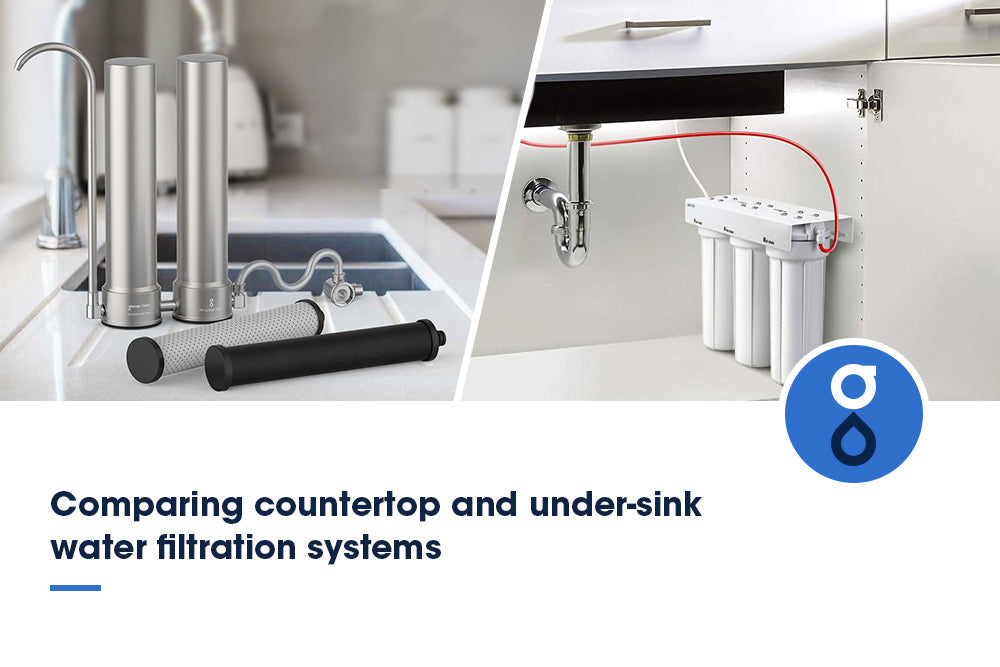Table of Contents:
What is a carbon block filter?
The mechanism of adsorption in carbon block filters
Types of carbon block filters
Pros and cons of carbon block filters
Roles of carbon block filters in water filtration systems
Maintainance and replacement of carbon block filters
FAQs
Conclusion
Clean, pure water is essential for your health. But do you know how your water filter works to remove impurities? The secret is often a key component known as a carbon block filter. These filters play a critical role in ensuring the water you drink is free from harmful contaminants. They're used in home filtration systems and commercial and industrial settings.
In this article, you'll learn about the different types of carbon block filters, how they work, and their pros and cons. You'll also get tips on maintenance and replacement. So, whether you're a homeowner looking to improve your water quality or a business owner aiming to ensure safe water for your operations, this guide is for you. Let's dive in and uncover the mystery behind carbon block filters in water filtration systems.
What is a carbon block filter?
Carbon block filters are renowned for their contaminant removal capabilities. They're designed to remove chlorine, sediment, volatile organic compounds (VOCs), and other impurities that can negatively impact your health. They do this while maintaining the essential minerals that your body needs.
But what about filter longevity? A carbon block filter is a long-lasting solution. It typically lasts six months to a year, depending on your usage. This makes it a cost-effective choice when you do a cost analysis. The environmental impact is another significant advantage. Using a carbon block filter reduces the number of plastic water bottles that end up in landfill sites.
The mechanism of adsorption in carbon block filters

In the realm of purification, it's adsorption, not to be confused with absorption, that's the key player in the effective functioning of these units. The adsorption process is the secret behind a carbon block filter's ability to trap contaminants and purify your water.
This process relies heavily on the surface area, with the larger surface area resulting in greater adsorption efficiency. It involves a chemical interaction between the contaminants in the water and the carbon block filter. To give you a clearer picture of how this process works, let's consider this table:

Remember, the surface area's importance cannot be overstated. A larger surface area provides more room for adsorption, trapping more contaminants. This understanding of adsorption will help you appreciate the functionality and efficiency of carbon block filters in your water filtration system.
Types of carbon block filters
Carbon block filters come in several varieties, each designed to meet specific needs regarding filter longevity, contaminant removal, health benefits, filter materials, and environmental impact. Here's a quick rundown of the primary types:
· Standard carbon block filters: These are the most common type, providing a good balance between cost, longevity, and contaminant removal.
· Chloramine removal filters: These are designed specifically to remove chloramines, which are increasingly used in water treatment and can be harmful when consumed.
· Lead & cyst filters: These filters enhance protection against harmful lead particles and cysts.
· High capacity filters: These filters are built for longevity, requiring fewer changes and thus reducing environmental impact.
· Ceramic carbon block filters: These combine the benefits of carbon filtration with ceramic's ability to filter out harmful bacteria and cysts.
Each of these carbon block filters offers unique benefits, so choosing the one that best suits your water filtration needs is essential. Remember, the right filter can not only provide cleaner, healthier water but can also have a lesser environmental footprint.
Pros and cons of carbon block filters
While they're certainly an impressive bit of tech, it's a worthwhile endeavor to delve into the upsides and downsides of using these purification powerhouses.
For one, carbon block filters offer significant health benefits. They're adept at removing harmful substances from your water, like chlorine, sediment, and volatile organic compounds. This ensures you're drinking water that's not just clean but also healthier. In terms of filter longevity, carbon block filters are a standout choice. They usually last longer than other types of filters, reducing the frequency of replacement and making them cost-effective in the long run.
However, their initial cost and installation challenges could be a drawback for some. They might require professional installation, adding to your initial outlay. Consider the environmental impact too. While they help reduce the number of plastic water bottles used, the carbon filters aren't recyclable and end up in landfills. It's a trade-off you'll have to consider.
So, while carbon block filters have many benefits, the drawbacks are worth considering. Balance the initial cost and installation challenges against the health benefits and cost-effectiveness in the long run to make an informed choice.
Roles of carbon block filters in water filtration systems
The function of activated carbon in water filtration

Activated carbon is like a superhero in water filtration systems, swooping in to trap and remove impurities, leaving you with clean and refreshing water. These carbon block filters effectively remove contaminants such as chlorine, volatile organic compounds (VOCs), and sediment from your water supply.
The secret lies in the porous structure of the carbon, which provides a large surface area for adsorption. As water passes through the carbon block, impurities are attracted to the surface of the carbon particles and become trapped. This process not only improves the taste and odor of the water but also reduces the risk of ingesting harmful substances.
Additionally, activated carbon block filters can remove heavy metals like lead and mercury, making them an essential component of any water filtration system.
Removing contaminants with carbon block filters
Carbon block filters are designed with a dense structure that efficiently removes contaminants from water. These filters effectively remove chlorine, pesticides, herbicides, and volatile organic compounds (VOCs). The activated carbon in the filters acts as a sponge, absorbing these contaminants as water passes through.
The carbon block's large surface area allows maximum contact with the water, ensuring thorough filtration. In addition to removing harmful substances, carbon block filters also help improve the taste and odor of water by reducing chlorine and other unpleasant flavors.
Commercial applications of carbon block filters
One primary application of carbon block filters in commercial settings is in the food and beverage industry. These filters are used to remove chlorine, sediment, and other impurities from water used to produce beverages and food products. They help enhance the taste and purity of the final products, ensuring customer satisfaction.
Carbon block filters are also used in the healthcare industry to provide clean and safe water for medical equipment, laboratories, and dialysis machines. Additionally, these filters are utilized in manufacturing plants to remove harmful chemicals and impurities from water used in various industrial processes. Overall, carbon block filters play a crucial role in maintaining water quality and ensuring the smooth operation of commercial establishments.
Maintainance and replacement of carbon block filters

Maintenance involves periodic cleaning of the filter to remove any accumulated particles, sediments, and contaminants. This can be done by backwashing the filter or flushing it with clean water. Additionally, inspecting the filter for any signs of wear or damage, such as cracks or loose fittings, is essential.
Regular maintenance intervals can vary depending on the filter and water quality, but recommendations typically range from every 3 to 6 months. The frequency of filter replacement largely depends on the volume of water filtered and the specific filter's capacity. On average, carbon block filters should be replaced every 6 to 12 months to ensure optimal performance. Signs of wear include:
- A decrease in water flow rate.
- Changes in water taste or odor.
- An increase in the presence of contaminants in the filtered water.
If any of these signs are noticed, it is recommended to replace the filter promptly.
In addition to maintenance and replacement, following the manufacturer's instructions for using the filter properly is advisable. Regularly monitoring water quality and testing for any potential contaminants can also help ensure the filter functions effectively.
FAQs
How does the effectiveness of carbon block filters compare to other water filtration methods?
They offer high filtration efficiency, effectively removing contaminants from your water. In terms of cost, they're generally more affordable and require less maintenance.
Can carbon block filters remove heavy metals from water?
Indeed, carbon block filters can remove heavy metals from water, reducing the risk of metal toxicity.
Is there a significant difference in taste when drinking water filtered through a carbon block filter?
Yes, there's a noticeable taste comparison with water filtered through a carbon block filter. It's smoother and cleaner.
Conclusion
In conclusion, you've learned how vital carbon block filters are in your water filtration system. They not only purify your water but also enhance its taste and smell. However, remember to maintain and replace them regularly for optimal performance. Despite some drawbacks, their benefits outweigh any cons. So, ensure you're making the most of your carbon block filters.
















